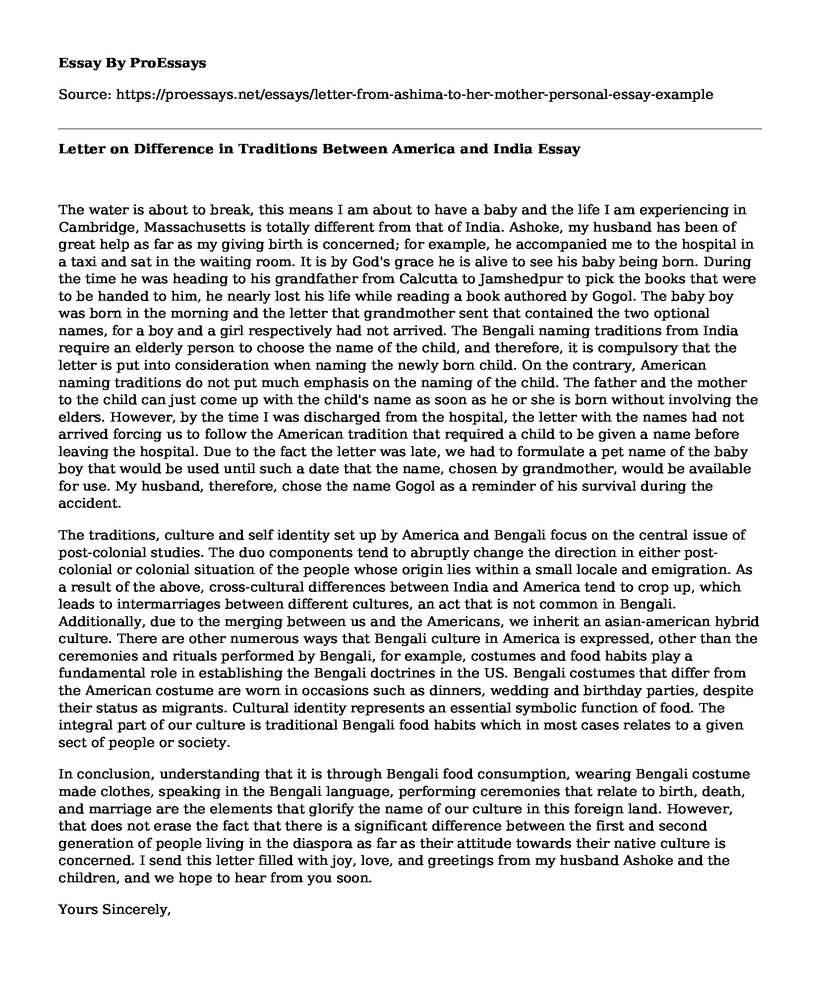The water is about to break, this means I am about to have a baby and the life I am experiencing in Cambridge, Massachusetts is totally different from that of India. Ashoke, my husband has been of great help as far as my giving birth is concerned; for example, he accompanied me to the hospital in a taxi and sat in the waiting room. It is by God's grace he is alive to see his baby being born. During the time he was heading to his grandfather from Calcutta to Jamshedpur to pick the books that were to be handed to him, he nearly lost his life while reading a book authored by Gogol. The baby boy was born in the morning and the letter that grandmother sent that contained the two optional names, for a boy and a girl respectively had not arrived. The Bengali naming traditions from India require an elderly person to choose the name of the child, and therefore, it is compulsory that the letter is put into consideration when naming the newly born child. On the contrary, American naming traditions do not put much emphasis on the naming of the child. The father and the mother to the child can just come up with the child's name as soon as he or she is born without involving the elders. However, by the time I was discharged from the hospital, the letter with the names had not arrived forcing us to follow the American tradition that required a child to be given a name before leaving the hospital. Due to the fact the letter was late, we had to formulate a pet name of the baby boy that would be used until such a date that the name, chosen by grandmother, would be available for use. My husband, therefore, chose the name Gogol as a reminder of his survival during the accident.
The traditions, culture and self identity set up by America and Bengali focus on the central issue of post-colonial studies. The duo components tend to abruptly change the direction in either post-colonial or colonial situation of the people whose origin lies within a small locale and emigration. As a result of the above, cross-cultural differences between India and America tend to crop up, which leads to intermarriages between different cultures, an act that is not common in Bengali. Additionally, due to the merging between us and the Americans, we inherit an asian-american hybrid culture. There are other numerous ways that Bengali culture in America is expressed, other than the ceremonies and rituals performed by Bengali, for example, costumes and food habits play a fundamental role in establishing the Bengali doctrines in the US. Bengali costumes that differ from the American costume are worn in occasions such as dinners, wedding and birthday parties, despite their status as migrants. Cultural identity represents an essential symbolic function of food. The integral part of our culture is traditional Bengali food habits which in most cases relates to a given sect of people or society.
In conclusion, understanding that it is through Bengali food consumption, wearing Bengali costume made clothes, speaking in the Bengali language, performing ceremonies that relate to birth, death, and marriage are the elements that glorify the name of our culture in this foreign land. However, that does not erase the fact that there is a significant difference between the first and second generation of people living in the diaspora as far as their attitude towards their native culture is concerned. I send this letter filled with joy, love, and greetings from my husband Ashoke and the children, and we hope to hear from you soon.
Yours Sincerely,
Ashima
Cite this page
Letter on Difference in Traditions Between America and India. (2021, Jun 18). Retrieved from https://proessays.net/essays/letter-from-ashima-to-her-mother-personal-essay-example
If you are the original author of this essay and no longer wish to have it published on the ProEssays website, please click below to request its removal:
- Background of Natural History Museum of Los Angeles and SWOT Analysis
- Views on Richard Rodriguez's Criticism Towards Bilingual Education in the United States
- Cultural Identity Commitment Essay
- Essay Example on Language: Fixed or Variable Code?
- Essay Example on Native American Historical Trauma: Evidence-Based Practice Prospects
- Essay Example on Tracking Physical Growth: Key to Understanding Children's Cognitive Development
- Diverse Cultural Perspectives - Essay Sample







